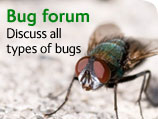Exotic sac spider, Cheiracanthium
Body size
Females and males in the range of 5 to 10mm.
Appearance
Slim and pale-coloured. Often found together with a silken nest, the 'sac'. Identification of the relevant species is possible only on the basis of microscopic characters.
Habitat, range and season
Cheiracanthium species are common in many parts of the world, including Europe. The species most likely to be responsible for a bite include: C. punctorium (Europe); C. mildei (Europe and N. America); C. inclusum (North, Central and South America); C. lawrencei (South Africa); and C. japonicum (Japan). Imported species are frequently associated with grapes.
Bite reports
Some species of the genus bite readily if their movements are restricted. Typically, the bite is sharp and painful, with pain, immediate and radiating, lasting for 30-45 mins, plus erythema and swelling. A wheal may develop, producing a necrotic area which can take 8 weeks to heal. Cheiracanthium lawrencei is said to be capable of causing cutaneous necrosis. Pain or numbness at the site of the bite may be followed by sweating and nausea lasting for up to 24 hours. After 48 hours, necrotic scar tissue may develop around the site of the bite (Newlands et al., 1980).

